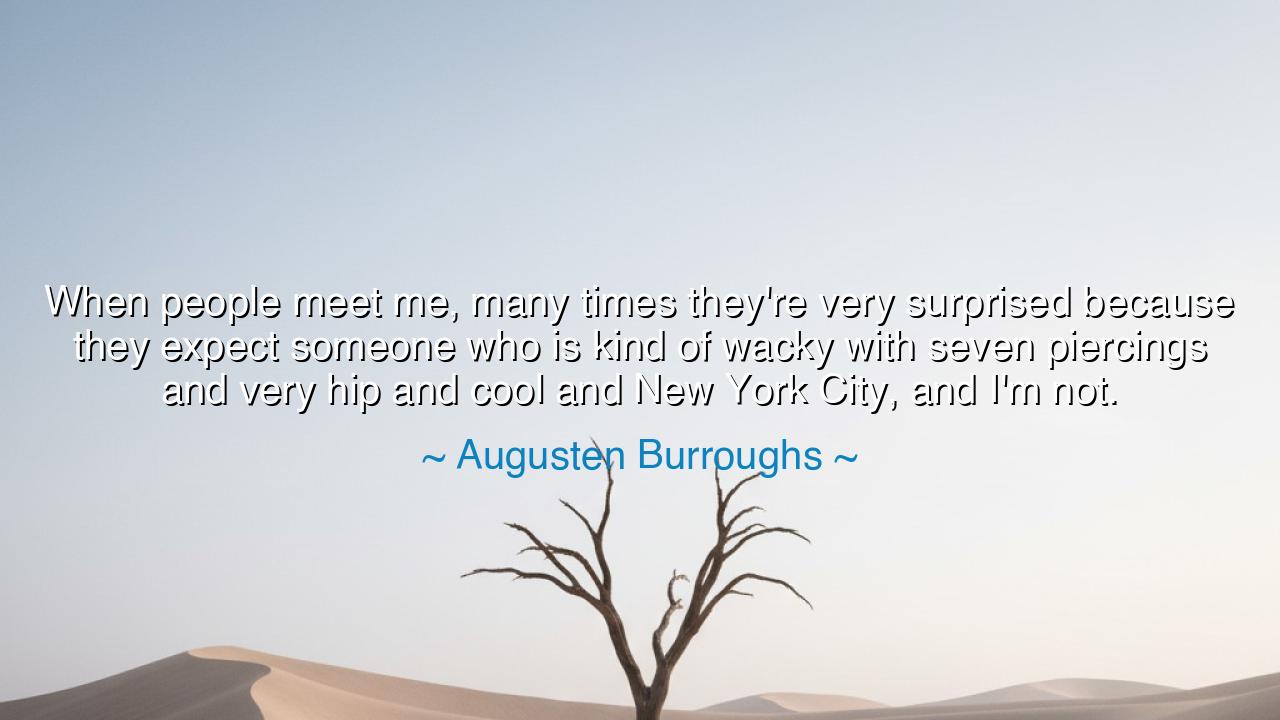
When people meet me, many times they're very surprised because
When people meet me, many times they're very surprised because they expect someone who is kind of wacky with seven piercings and very hip and cool and New York City, and I'm not.






In the course of human existence, we often find ourselves caught in the web of expectations—both our own and those imposed by society. The image we project to the world can become a mask, one that others come to expect and often, assume, without considering the truth beneath it. Augusten Burroughs, in his candid reflection, shares a moment of profound insight: "When people meet me, many times they're very surprised because they expect someone who is kind of wacky with seven piercings and very hip and cool and New York City, and I'm not." In these words, he challenges the assumptions we make about others based on appearance and stereotype, revealing the power of authenticity and the misunderstandings that often arise when we fail to see the true essence of a person.
In the ancient world, the struggle between appearance and reality was a central theme in the works of great philosophers and playwrights. The Greeks, in their reflections on human nature, often warned against the dangers of superficial judgment. In Plato's Republic, for example, the philosopher Socrates discusses the importance of seeing beyond the physical appearance to understand the true nature of things. He teaches that the visible world is often an illusion, and that only by looking deeper—into the soul and spirit—can one understand the true nature of a person. Burroughs’ words echo this ancient wisdom, reminding us that we must resist the temptation to judge a book by its cover, for what we expect and what truly is, can be very different.
The masks that people wear in society are not new. Consider the Roman Emperor Nerva, who, though a leader of great power, was known for his simplicity and modesty. Despite his imperial status, Nerva did not embrace the extravagant symbols of wealth and power that other emperors flaunted. Instead, he focused on governing with wisdom and justice, earning the respect of his people not by how he presented himself outwardly but by the character he exhibited. His actions revealed his true nature, just as Burroughs' humility and self-awareness shine through despite the world’s expectations of him. Nerva’s example teaches that true greatness is not about the image we project, but about the virtue that resides in the heart.
In the same vein, Augusten Burroughs reveals a deeper truth about the discrepancies between who we are and how the world expects us to be. Society often associates certain behaviors or appearances with specific identities. The wacky, hip, cool persona Burroughs mentions is a stereotype attached to those living in places like New York City—a persona that assumes extravagance, nonchalance, and a rebellious spirit. However, Burroughs challenges this narrative, revealing that the person within does not fit the mold that others have placed upon him. This is a powerful reminder that we are not defined by expectations—whether they are based on where we come from, how we look, or the labels others assign to us. Our true selves are far more complex and worthy of exploration.
Consider the story of Socrates, the philosopher who was known for his humble appearance and unassuming demeanor. He did not conform to the expectations of what an educated or influential person should be. In fact, many of his contemporaries were surprised to find that this humble man was the source of deep philosophical insights. Socrates’ life was a testament to the wisdom that comes from humility, and his example encourages us to reject the superficial judgments we make based on appearance. Just as Socrates taught his followers to look deeper into the essence of life, we too must resist the urge to reduce people to outward appearances and instead seek to understand their true nature.
Burroughs’ reflection offers an important lesson in self-awareness and authenticity. He reminds us that we are not our expectations or the images others impose upon us. It is easy to fall into the trap of wearing a mask that reflects what others want to see, but true freedom and peace come when we embrace our genuine selves, unburdened by societal pressures. The world may expect us to be a certain way, to fit into a particular mold, but we hold the power to break free from these confines and live in alignment with who we truly are.
The lesson here is that authenticity is far more important than conformity. When we shed the layers of expectation that others place on us, we are able to live in alignment with our true selves. Just as Augusten Burroughs rejects the external image others have of him, so too can we resist the societal pressures that tell us who we should be. In a world filled with labels and assumptions, we must remind ourselves that our value lies not in what others think of us, but in the authenticity we bring to the world. Let us embrace our true selves, not as others expect us to be, but as we know ourselves to be. Through this, we become free to face life not as a reflection of others’ desires, but as a powerful expression of our own truth.






AAdministratorAdministrator
Welcome, honored guests. Please leave a comment, we will respond soon